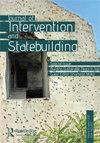没有国家建设的国家建设?合法性、国家失败与制度主义方法的局限性
IF 2.3
2区 社会学
Q1 INTERNATIONAL RELATIONS
引用次数: 190
摘要
试图(重新)构建国家机构而不考虑社会的社会政治凝聚力的悖论在世界各地反复出现,最明显的是今天在中东、非洲和巴尔干地区。本文试图对围绕国家和民族建设概念的争论提供一些启示。借鉴对现代民族国家的社会学理解,它认为不可能将国家建设视为一个独立于民族建设的过程。本文确定了关于国家建设过程的讨论中两种不同的思想流派,每一种都反映了对国家的不同社会学理解。第一种是与韦伯国家概念密切相关的“制度方法”,它关注制度重建的重要性,并假设国家建设活动不一定需要伴随的国家建设努力。第二种是受涂尔干社会学影响的“合法性方法”,它承认巩固中央国家机构的必要性,但更强调这一过程中社会政治凝聚力的重要性。本文以第二种方法为基础,并展示了其与当代国家建设的相关性,最后讨论了最近的国家建设尝试以及外部行为者有效促进国家建设进程的方式。本文章由计算机程序翻译,如有差异,请以英文原文为准。
Statebuilding without Nation-building? Legitimacy, State Failure and the Limits of the Institutionalist Approach
Abstract The paradox of attempting to (re)construct state institutions without considering the socio-political cohesion of societies recurs throughout the world, most notably today in the Middle East, Africa and the Balkans. This essay tries to shed some light on the debate around the concepts of state and nation-building. Drawing on a sociological understanding of the modern nation-state, it contends that it is impossible to conceive of statebuilding as a process separate from nation-building. This essay identifies two different schools of thought in the discussion concerning the statebuilding process, each of which reflects different sociological understandings of the state. The first one, an ‘institutional approach’ closely related to the Weberian conception of the state, focuses on the importance of institutional reconstruction and postulates that statebuilding activities do not necessarily require a concomitant nation-building effort. The second, a ‘legitimacy approach’ influenced by Durkheimian sociology, recognizes the need to consolidate central state institutions, but puts more emphasis on the importance of socio-political cohesion in the process. Building on this second approach and demonstrating its relevance in contemporary statebuilding, this article concludes with a discussion of recent statebuilding attempts and the ways external actors can effectively contribute to statebuilding processes.
求助全文
通过发布文献求助,成功后即可免费获取论文全文。
去求助
来源期刊

Journal of Intervention and Statebuilding
INTERNATIONAL RELATIONS-
CiteScore
5.20
自引率
20.00%
发文量
21
期刊介绍:
The Journal of Intervention and Statebuilding is a cross-disciplinary journal devoted to critical analysis of international intervention, focussing on interactions and practices that shape, influence and transform states and societies. In 21st century political practice, states and other actors increasingly strive to transplant what they see as normatively progressive political orders to other contexts. Accordingly, JISB focuses on the complex interconnections and mutually shaping interactions between donor and recipient communities within military, economic, social, or other interventional contexts, and welcomes perspectives on political life of, and beyond, European state-building processes. The journal brings together academics and practitioners from cross-disciplinary backgrounds, including international relations, political science, political economy, sociology, international law, social anthropology, geography, and regional studies. The editors are particularly interested in specific or comparative in-depth analyses of contemporary or historical interventions and state-building processes that are grounded in careful fieldwork and/or innovative methodologies. Multi or cross-disciplinary contributions and theoretically challenging pieces that broaden the study of intervention and state building to encompass processes of decision-making, or the complex interplay between actors on the ground, are especially encouraged.
 求助内容:
求助内容: 应助结果提醒方式:
应助结果提醒方式:


